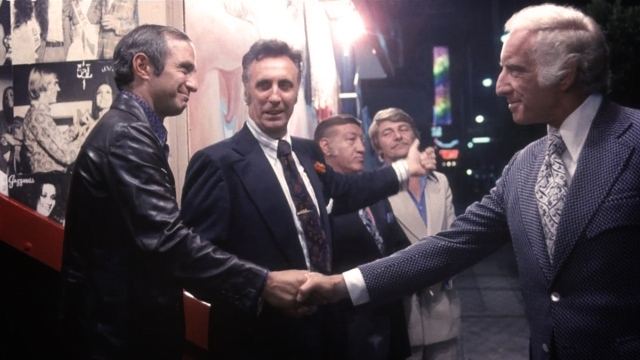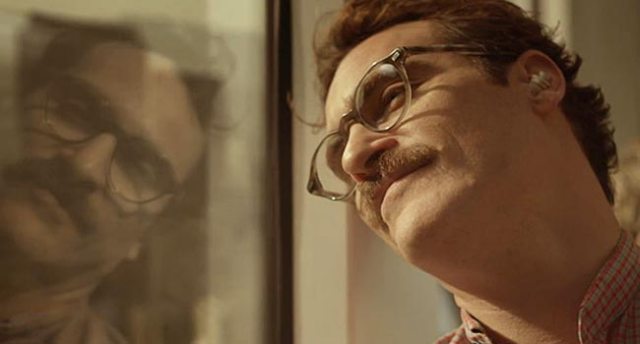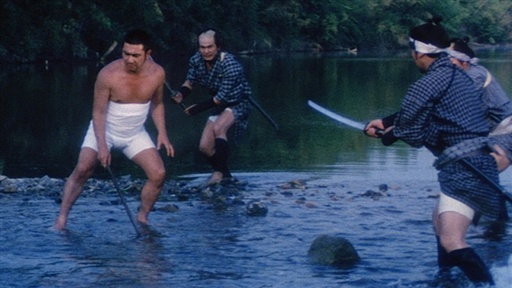“A Spike Jonze Love Story” is such a seemingly simple but strangely disarming pronouncement. Spike Jonze directing a love story? There has to be some kind of catch, right? This is after all a guy who is probably still most known for his iconic, endlessly inventive 1990s music videos and as a co-creator of Jackass. His career as a feature filmmaker has yielded two trips down the rabbit hole that is the mind of Charlie Kaufmann, and an achingly melancholic adaptation of a classic children’s story. You hear the film’s premise, a man falls in love with his operating system, and you’re still left unsure as to how this is going to play. So what does Her ultimately end up being? First off, a genuine love story. But also a fascinating “what if?” scenario that actually carries with it an air of strange plausibility. An examination on the nature of relationships and the universal desire for feeling and connection. A satirical look on the contradictory nature of the modern/future technological world, more interconnected than ever before but also more alienated than ever before. A prospective glimpse at that seemingly inevitable and uneasy moment sometime in the near future when artificial intelligence takes on a life of its own and moves into a new realm of understanding humanity is unable to comprehend. And wonderful in just about every way imaginable.
The worry would be for the film to collapse under the weight of its many layers, but Her never feels like an unwieldy mish-mash of ideas all vying for equal attention. Even considering the handful of moments of brash comedy, there’s a lightness to Jonze’s filmmaking here that keeps everything in focus, never letting the larger statements overwhelm the more personal elements. Take for example the vision of the near-future. Jonze could have easily played up various exaggerations for comic effect. Instead he holds back and creates a realistic portrait of what the years to come could conceivably look like. In part because of that light touch, the performances really shine; Joaquin Phoenix and Scarlett Johansson never strike a false note, and Amy Adams nails her low-key but important supporting role. All put together, you end up with something really special. I’ve seen the film twice now in the theaters. The first time, I knew it was one of the year’s best films, but a mostly unreceptive audience (who would break into awkward laughter at the most inappropriate of moments) left me with the need to return to it again. The second time, everything clicked. Her feels like the film from 2013, the one to which I’ll gladly return over and over again in the years to come. 10/10.
 The Killing Of A Chinese Bookie
The Killing Of A Chinese Bookie
After three failed attempts at connecting with the films of John Cassavetes, I went into this 1976 effort free of any preconceived notions of finding greatness. Instead, I tried to take the film on its own terms, and it helped that I was interested in seeing how the filmmaker handled what I suppose could be called a “genre picture,” in this case a gritty crime thriller with subtle noir influences. And maybe it was this more open approach, but I got more out of The Killing Of A Chinese Bookie than the other, more lauded, films of his I’ve seen. It isn’t what I’d call a great work, or even a particularly successful one, but it did manage to catch my interest (for the record, after my experiences with the interminably long Faces and A Woman Under The Influence, I opted for the shorter, 108-minute cut) The narrative is intentionally spare. introducing low-rent strip joint owner Cosmo Vittelli as a man in a perpetual state of debt to the wrong people. After burying himself into a deep hole with little chance of climbing back out, Cosmo is offered a deal: kill the titular Chinese bookie of the title, and the debt will be erased.
That sounds like well-worn genre material, but truthfully Cassavetes never seems particularly interested in standard plot mechanics. The lack of interest is a problem though, as it lends The Killing Of A Chinese Bookie an uneven quality, meandering and lackadaisical without much of anything in the way of high stakes. But there’s real interest in the Cosmo character. As played by Ben Gazzara, Cosmo is an odd little creation, a loser who is nevertheless able to find comfort and happiness in his work running his sleazy strip joint. This is a guy who, on his way to commit murder, stops at a payphone to call his club and check in to see if everything is running smoothly, so devoted is he to his place of business. All it takes is a couple minutes watching one of the “performances” in the club to get the place is a complete dive, but to Cosmo it’s Heaven, a place where nothing ever happens and where he can hold power and control over his life. The performances in Cassavetes films have always struck me as a little “off,” too self-aware and theatrical, but that wasn’t a problem for me here. Gazzara’s performance feels genuine, and I think that quality helped me for the first time to appreciate a Cassavetes work outside of its place in history. 6/10.
The seventh film in the Zatoichi series. Director Kazuo Ikehiro returns for his second turn behind the camera, but the results here are slightly less satisfying than they were in the high-energy Zatoichi And The Chest Of Gold. After a cheeky introduction demonstrating that not even flies are safe from Zatoichi’s cane sword, the real action begins when the blind swordsman suffers a serious wound from a musket bullet. After being nursed back to health by a traveling woman, Zatoichi journeys to her hometown to thank her properly. Upon his arrival, he learns of an upcoming fireworks celebration, and also of the usual strife plaguing the town. Despite the danger, Zatoichi decides to stick around, both to help his rescuer and to take in the fireworks show (even though he can’t see them, he enjoys the sounds they make and the images they spark in his mind).
The Zatoichi films have never been what you would call extravagant productions, but this is the first film in the series that comes across as a little “cheap.” The action is relegated to only a handful of low-key settings, and scenes oftentimes play out entirely in wide shots, as if there wasn’t enough time to get all the proper coverage needed. Zatoichi himself is left languishing on the sidelines for most of the running length. He’s never been the most active of screen heroes, but here he’s not much more than a bystander to the main action, and for the first time in the series star Shintaro Katsu is offscreen for significant stretches of time. But much like Zatoichi The Fugitive, Zatoichi’s Flashing Sword really comes alive when the swords start flying, and a couple of these scenes stand out as some of the best in the series. The first is a mid-film fight sequence between Zatoichi and a group of attackers that occurs entirely in water. The second is the film’s closing setpiece, a nighttime bloodbath punctuated by multicolored light as fireworks explode from above. This sequence contains what may be the definitive action moment of the series, a corridor standoff where Zatoichi systematically slices through a line of candles, shrouding himself in darkness and leveling the playing field against his sighted opponents. Even though much of Zatoichi’s Flashing Sword quickly passes from memory, I doubt I’ll ever forget the film’s most rousing moments. 6/10.
Trailers/Clips:


